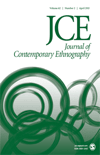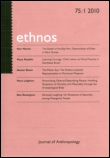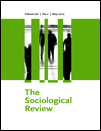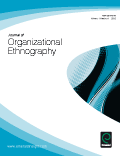
JOURNAL OF CONTEMPORARY ETHNOGRAPHY
Scope & Guideline
Engaging with the Pulse of Modern Anthropology
Introduction
Aims and Scopes
- Ethnographic Methodologies:
The journal emphasizes the use of ethnographic methods to explore diverse social phenomena, encouraging researchers to engage deeply with the contexts and communities they study. - Reflexivity and Positionality:
A consistent focus on reflexivity in research is evident, with researchers encouraged to critically reflect on their own positionality and the impact it has on their findings and interpretations. - Interdisciplinary Approaches:
The journal promotes interdisciplinary research, integrating perspectives from sociology, anthropology, cultural studies, and other fields to enrich ethnographic inquiry. - Contemporary Social Issues:
Articles often address pressing social issues, such as gender, race, class, and identity, using ethnography to unveil the complexities of these topics within various cultural contexts. - Autoethnography:
A significant contribution of the journal is the promotion of autoethnographic work, where researchers use personal narratives to reflect on broader cultural and social phenomena.
Trending and Emerging
- Autoethnographic Narratives:
There is a growing trend towards autoethnographic narratives, where researchers intertwine personal stories with broader cultural analyses, allowing for deeper engagement with the subject matter. - Digital Ethnography:
Studies focusing on digital spaces and online communities are on the rise, reflecting the increasing importance of technology in contemporary social interactions and cultural practices. - Intersectionality:
Research exploring intersectional identities—how race, gender, class, and other social categories interact—is becoming more prominent, indicating a shift towards more nuanced analyses of identity. - Environmental and Climate Ethnography:
The journal is seeing an uptick in ethnographic research related to environmental issues and climate activism, underscoring the relevance of ethnography in understanding contemporary ecological challenges. - Community and Collective Identity:
Emerging themes on community building and collective identity formation within various social movements highlight the importance of ethnography in documenting and analyzing grassroots activism.
Declining or Waning
- Traditional Ethnographic Studies:
There appears to be a decline in traditional ethnographic studies that focus solely on observational research without incorporating reflexive or autoethnographic elements, suggesting a shift towards more engaged and reflective methodologies. - Fixed Cultural Representations:
Themes centered on static or monolithic representations of cultures are less common, indicating a move away from essentialist views towards more dynamic and fluid understandings of identity and culture. - Descriptive Ethnographies:
The prevalence of purely descriptive ethnographies, which lack critical analysis or theoretical engagement, seems to be decreasing as scholars seek to integrate more analytical frameworks into their work. - Single-Country Focus:
Research focusing narrowly on single countries or contexts without comparative analysis is becoming less frequent, reflecting a growing interest in transnational and comparative ethnographies. - Ethnography in Isolation:
There is a noticeable decline in ethnographic studies that do not connect with broader social, political, or economic issues, suggesting a preference for research that situates ethnography within larger societal debates.
Similar Journals

ETHNOS
Shaping Narratives, Enriching DiscoursesETHNOS is a leading journal published by Routledge Journals, Taylor & Francis Ltd, dedicated to advancing the field of anthropology and archaeology. With an impressive impact factor reflected in its high Scopus rankings—#23 in Archaeology and #44 in Anthropology—the journal is recognized for its rigorous scholarship and its influence on contemporary discussions in social science. Operating since 1936, ETHNOS provides a vital platform for innovative research and theoretical discourse, making it an essential resource for professionals, academics, and students alike. Although it does not offer Open Access, its meticulous editorial standards and Q1 classification in both Anthropology and Archaeology guarantee substantive contributions to the study of culture and society. Located in the United Kingdom, the journal continues to shape the narratives surrounding social and cultural phenomena, enriching the academic landscape up to 2024 and beyond.

Revista Pos Ciencias Sociais
Fostering innovative research for a better tomorrow.Revista Pos Ciencias Sociais, published by UNIV FED MARANHAO, CENTRO CIENCIAS HUMANAS, is an esteemed open access journal in the field of social sciences that has been disseminating knowledge since 2004. With the ISSN 1983-4527 and E-ISSN 2236-9473, this journal aims to foster critical discourse and innovative research that address pressing social issues in Brazil and beyond. Although specific metrics like the H-index and Scopus ranks are currently unavailable, the journal remains committed to advancing the field through peer-reviewed articles, comprehensive reviews, and empirical studies. Accessible to a global audience, Revista Pos Ciencias Sociais serves as a vital platform for researchers, professionals, and students dedicated to exploring and addressing the complexities of human society while enriching the academic community with diverse perspectives.

Urbanities-Journal of Urban Ethnography
Bridging Anthropology and Urban ExperienceUrbanities - Journal of Urban Ethnography is a pivotal publication dedicated to the interdisciplinary field of urban anthropology. Published by the IUAES - Commission on Urban Anthropology in Italy, this journal serves as a platform for exploring the complexity of urban life through ethnographic methods, rigorously examining social practices, community dynamics, and cultural expressions within urban contexts. With its ISSN 2239-5725 and open access format, Urbanities promotes widespread dissemination of research findings, fostering academic discussions among researchers, professionals, and students alike. Over the years, it has secured a commendable standing in the academic community, evidenced by its Q2 ranking in Anthropology and Q3 in Urban Studies for 2023, along with respectable Scopus rankings. The journal's scope spans from 2015 to 2024, ensuring that it stays at the forefront of contemporary urban research. As a vital resource for anyone interested in the nuances of urban environments, Urbanities invites contributions that enrich our understanding of the urban experience and its myriad cultural dimensions.

Revista de Etnografie si Folclor-Journal of Ethnography and Folklore
Advancing Scholarship in Anthropology and FolkloreRevista de Etnografie si Folclor-Journal of Ethnography and Folklore, an esteemed publication by EDITURA ACAD ROMANE, serves as a vital platform for the dissemination of research and scholarship in the fields of anthropology and cultural studies. Established in Romania, this journal has committed itself to exploring the rich tapestry of ethnographic practices and folklore traditions, favoring interdisciplinary approaches that illuminate the diverse cultural heritage of societies. With an ISSN of 0034-8198, the journal has been instrumental in fostering academic dialogue and engaging researchers, professionals, and students alike. Though currently classified in the Q4 category of both anthropology and cultural studies, its continued growth from 2014 to 2024 signals an evolving contribution to understanding cultural dynamics. Accessible via traditional publication means, the journal encourages contributions that deepen the understanding of ethnographic methodologies and cultural narratives, thereby enriching the academic landscape.

SOCIOLOGICAL REVIEW
Illuminating diverse social theories for a better tomorrow.Sociological Review is a premier journal in the field of sociology and political science, published by SAGE Publications Ltd and holding a prestigious Q1 ranking as of 2023. With its rich legacy dating back to 1908, this journal serves as a vital platform for disseminating cutting-edge research and critical discourse that shapes contemporary sociological and political inquiry. Based in the United Kingdom, it offers insights into diverse social theories, empirical studies, and pressing societal issues, appealing to researchers, professionals, and students alike. Although not an open-access journal, it maintains a strong impact within the academic community, reflected in its Scopus ranking of #266 out of 1466 in the Social Sciences category, positioning it in the 81st percentile. Through its commitment to high-quality scholarship and intellectual debate, the Sociological Review continues to influence both academia and policy, making it an essential resource for those seeking to engage with the complexities of society.

Visual Ethnography
Connecting Visual Culture and Ethnographic InquiryVisual Ethnography, published by UNIV BASILICATA, is an innovative academic journal dedicated to the interdisciplinary exploration of visual methodologies within the realms of Anthropology, Communication, and Cultural Studies. With a notable emphasis on visual ethnographic practices, this journal serves as an essential platform for researchers, professionals, and students aiming to bridge the gap between visual representation and cultural analysis. Since its inception in 2012, Visual Ethnography has contributed significantly to the academic discourse, despite its current positioning in the lower quartiles of its field as evidenced by its Scopus rankings. The journal actively engages its audience by providing open access options, ensuring that scholarship in visual culture is available to a wider community. With the academic landscape continually evolving, Visual Ethnography remains a vital resource for those seeking to understand the complexities of culture through a visual lens in the context of today’s globalized society.

DIALECTICAL ANTHROPOLOGY
Illuminating the Nuances of Dialectical ThoughtDIALECTICAL ANTHROPOLOGY, published by SPRINGER, is a prestigious journal within the field of anthropology, recognized for its substantial contributions to dialectical and critical theory in social research. Since its inception in 1975, the journal has carved a niche by exploring the intersections of culture, society, and politics, making it an essential resource for scholars and practitioners. With an impact factor that places it in the Q2 category for both anthropology and arts and humanities, and significant rankings in sociology and political science, it reflects a solid scholarly reputation. The journal operates on a subscription basis, allowing for a wide dissemination of rigorous academic research without open access. With ISSN 0304-4092 and E-ISSN 1573-0786, DIALECTICAL ANTHROPOLOGY serves as a crucial platform for fostering dialogue and advancing knowledge in contemporary anthropology and related disciplines. As a researcher, professional, or student, engaging with the insights presented in this journal will deepen your understanding of the dynamic interplay between structural and agency-oriented perspectives in social contexts.

ANTHROPOS
Bridging the gap between anthropology and the humanities.ANTHROPOS is a distinguished journal published by NOMOS VERLAGSGESELLSCHAFT MBH & CO KG, anchoring its academic presence in Switzerland since its inception in 1983. With a commitment to advancing the fields of Anthropology and Arts and Humanities, this peer-reviewed publication serves as a vital platform for scholarly research, providing critical insights and fostering dialogue among researchers, professionals, and students alike. ANTHROPOS is categorized in Q3 for both Anthropology and the broader Arts and Humanities domains as of 2023, indicating its reputable yet emerging presence within these disciplines. Despite its significant contributions, the journal currently does not feature open access options, urging readers to engage through traditional academic channels. By embracing interdisciplinary approaches and contemporary issues, ANTHROPOS aims to illuminate complex cultural phenomena, making it an essential resource for anyone dedicated to understanding the intricacies of human societies.

Journal of Organizational Ethnography
Navigating the Intricacies of Organizational LifeJournal of Organizational Ethnography is a prestigious academic journal published by Emerald Group Publishing Ltd, renowned for its comprehensive exploration of organizational culture and behavior through the lens of ethnographic research. Since its inception in 2012, the journal has become a key platform for scholars and practitioners in the fields of Anthropology, Cultural Studies, and Organizational Behavior, ranking Q1 in both Anthropology and Cultural Studies, and maintaining strong placements across other relevant disciplines. With an emphasis on qualitative methodologies and reflexivity, the journal aims to illuminate the complex dynamics within organizations, fostering dialogue and innovation. The Journal of Organizational Ethnography is essential for researchers, professionals, and students looking to deepen their understanding of organizational practices, navigate cultural complexities, and engage in critical conversations that shape the future of the workplace. For those interested in contributing or accessing valuable research, this journal stands as a vital resource in the academic community.

AREA
Unlocking Insights for a Sustainable FutureAREA, with ISSN 0004-0894 and E-ISSN 1475-4762, is a premier open access journal published by Wiley since 2018, and situated in the heart of the United Kingdom. Recognized as a Q1 journal in Geography, Planning, and Development for 2023, it ranks impressively at #154 out of 821 in its category on Scopus, placing it in the 81st percentile. This esteemed journal, which has been a prominent venue for scholarly discourse since its inception in 1976, invites original research articles, reviews, and commentary that advance understanding and contribute significantly to the fields of geography and urban planning. As an open access journal, AREA ensures that high-quality research is readily available to a global audience, thus facilitating knowledge exchange and encouraging innovative approaches to geographical questions. Researchers, professionals, and students alike will find AREA to be an invaluable resource for cutting-edge insights and compelling discussions that shape the future of spatial analysis and environmental policy.